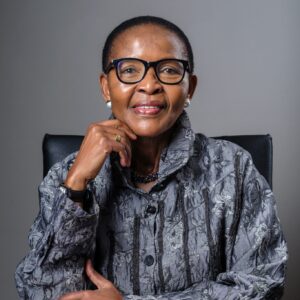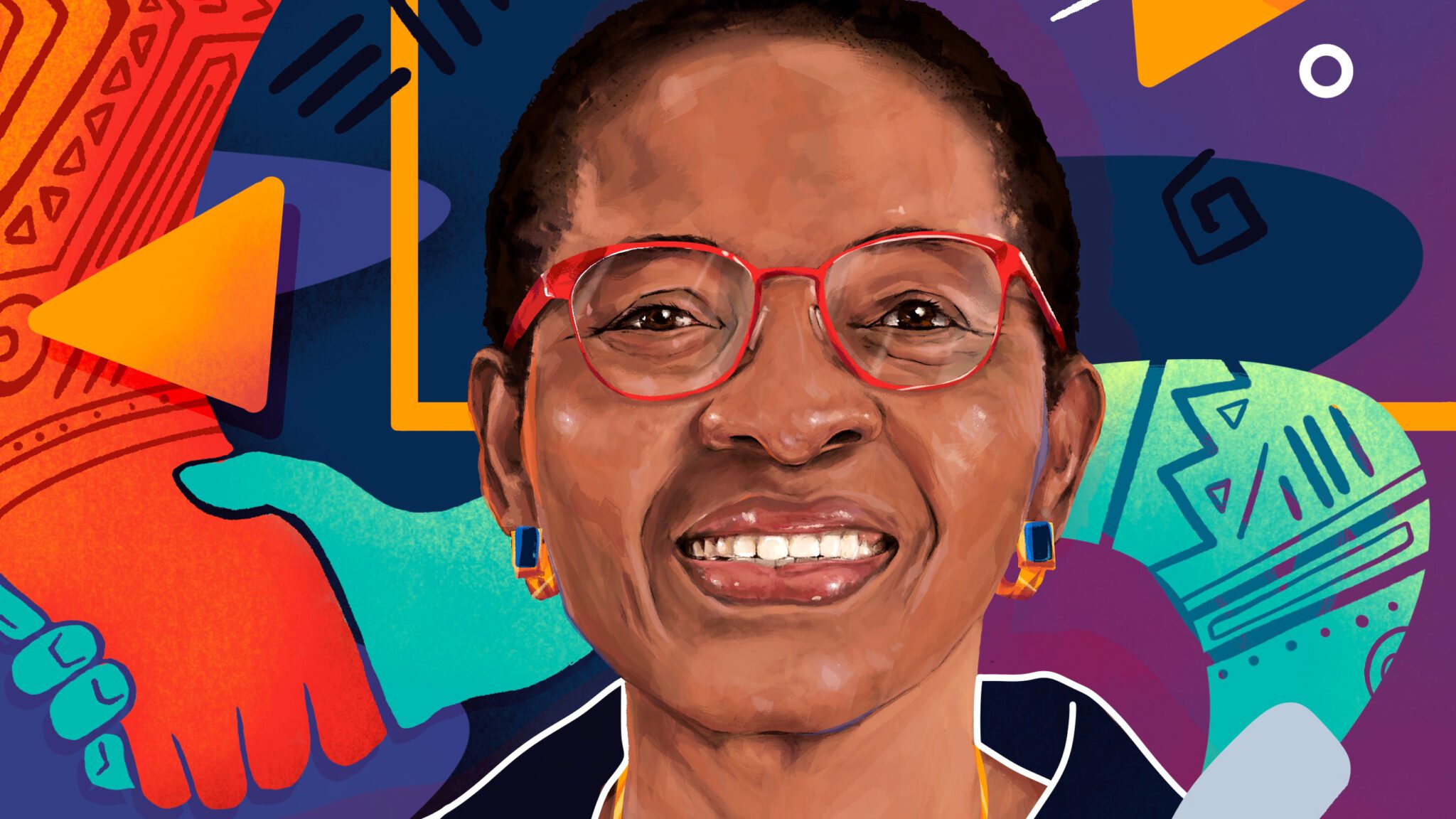Dr. Pumla Gobodo-Madikizela is a woman with a vast imagination. She’s capable of imagining changes of heart that many would dismiss as impossible. She can imagine people who have committed terrible atrocities, and the people they have hurt, turning toward each other instead of turning away. But she’s realistic, too. She knows that repair doesn’t come easily; that sometimes forgiveness is more akin to a posture we strive to adopt, than a task we can complete—that sometimes, it takes a lifetime.
It’s a quest the winner of the 2024 Templeton Prize has been researching for years—and wants to spend the rest of her life exploring. The 69-year-old psychologist is the South African National Research Foundation’s Chair in Violent Histories and Transgenerational Trauma, and she is the founding director of Stellenbosch University’s Centre for the Study of the Afterlife of Violence and the Reparative Quest.
Pumla’s desire to keep working and her complete disinterest in pursuing so-called “work-life balance” might sound strange, given the challenging nature of that work. It has involved sitting with people whose loved ones have been murdered, and being face-to-face with people who have committed murder. But once you see that her research has to do with empathy, healing, and hope, her passion starts to make sense.
Our interview begins with laughter. It’s late in the day in South Africa, and early in the day for me—very early. When Pumla found out just how early it would be, she urged me to reschedule, but I insisted this suited me fine. “Four AM!” Pumla says as I turn my video on, then: “Your face doesn’t look like a 4AM face!” I turn my head to show that even if this is true of my unwashed face, it’s not true of my unbrushed ponytail.
I ask Pumla to start by talking about what brought her joy as a child, and what brings her joy now. She tells me that as a child, it was her family. “I really loved my home because there was just so much love, and in my home, the sense of security.”
Pumla notes that these were “turbulent times; difficult and challenging times” for South Africa—in her book A Human Being Died That Night,she recalls the terrifying of “shooting, blood, and human death” in the street of Langa Tonwship, which was under siege by the apartheid police and army, when she was just five years old. Yet growing up with parents who taught their children how to love and care for others gave her “a sense of joy” amid racial segregation, discrimination, and state brutality.
And now? “My work, my work brings me joy.” When I ask what else sustains her, she says being a practicing Christian makes her feel “held.” She is yet to write about her faith in relation to her work, but “people generally sense that there is a spiritual dimension.”
Reading some of her writing before we met, I sensed it myself. She emphasizes reparation and redress in a time where the norm is rushing to rebuke, instead of taking time to repair, and where many prefer to hold grudges rather than release them. Her position struck me as countercultural, even counterintuitive.
It’s been decades, now, that Pumla has been exploring the possibility of repair and redress in contexts where forgiveness might seem unthinkable.
When a loved one has died, it presents “a complex situation,” she says. People can’t just “forgive and forget” as if nothing has happened, which is one of the reasons she says the word “forgiveness” might foster unhelpful assumptions. Some people, upon hearing Pumla say that it might be “the wrong word,” have told her, “You’re right, it’s wrong to forgive”.
But, she says, “That’s not what I mean.”
What she means is that in cases when it might seem impossible even to ask for forgiveness, or offer it, repair must not be understood as a one-off transaction but rather an ongoing movement, a kind of “spiral” towards reconciliation through engagement and reflection.
This “reparative quest” involves work, “and it’s the work that people often avoid”, Pumla says. For the wrong-doer, such work might mean asking difficult questions about why they did what they did, as well as taking responsibility for the consequences; while the person who has been on the receiving side of the violence might wonder how they can be sure the wrong-doer won’t offend again.
Even if the person on the receiving end longs to forgive, one might feel compelled to resist. “People are afraid,” Pumla says, particularly when allegiance to the lost loved one makes forgiveness feel like a betrayal. Further, hatred can become so entwined with a person’s identity, that in order to forgive, there’s a sense in which they’d have to “become someone else.” Being open to this, and open to the reciprocity of being touched by another in a profound way, make for a “deeply spiritual process” that “touches that core of being human.”

2024 Templeton Prize Winner Pumla Gobodo-Madikizela photographed in Cape Town, South Africa by Stefan Els for the Templeton Prize
The work Pumla undertook as a member of South Africa’s Truth and Reconciliation Commission in the 1990s included interviews with the imprisoned commander of government-backed assassination squads, Eugene de Kock. During the hours she spent face-to-face with him, she began to see his fear, vulnerability, and remorse; and found herself relating to him not as “a monster”, but a fellow human being.
In a moment that surprised, disturbed, and intrigued her, a moment she reflects on to this day, Pumla found herself touching his shaking hand. There’s “something about the presence of the human other” that makes boundaries collapse, Pumla says. “There’s a certain presence, and you are touched by this person, and then, of course, the possibility of actually physically touching the person, as it happened at that moment, has also got its own set of meanings.”
“I never said, ‘I forgive’,” she says, and De Kock also never asked for her forgiveness. But the way the encounter unfolded was “more powerful than the words.”
Another encounter Pumla often reflects on involved a woman telling a man who had worked for the apartheid police, and who had set up the ambush that killed the woman’s son, that he was her son’s age. The woman told the man that she didn’t think his mother, who gave him a name that means “prayer”, intended him to be a murderer.
She didn’t say, “You’re the same age as my son whom you killed,” Pumla notes, she said, “You’re the same age as my son.”
“In that moment, the mother is putting herself in the shoes of the other mother, and saying, this could have been my son.”
These kinds of encounters “allow one to come to the place where you really are reflective, to the point that you take the risk,” Pumla says.
“You take the risk of putting yourself in the shoes of the other, and imagining… Who would you have been?”
Because she was not born white, Pumla has not been asked questions like, “Did you participate in apartheid?”, “Did you support it?” If she dares, she can ask herself whether, if she had grown up under different circumstances, her answer might have been “yes.”
“The truth is, we cannot say. We don’t know.”
Accepting this truth, and this uncertainty, can create new spaces for empathy and reconciliation.
In addition to the “unforgivable” acts Pumla experienced in the society she grew up in, and the acts she’s documented on others’ behalf, she experienced infidelity early in her marriage. When her husband refused counseling, she left him and raised her son—who’s now in his 30s and still joins her for dinner on weekends—alone.
Pumla says she left her husband without anger. He continued to love their son, and she continued to facilitate contact. “We were not friends, but we were friendly.”
We talk about how forgiveness is hard, but holding a grudge is hard, too. Pumla says both are exhausting, but the latter is exhausting “in a way that eats you up,” that “eats the soul.”
“Sometimes you want to forgive, people want to forgive, and they do forgive. [But] sometimes there’s this feeling, did I do the right thing? Did I give this for free? So sometimes there’s just this constant questioning of the self.”
Yes, a person who wants to forgive might die trying, but the process is full of hope. “You’re trusting that this person will change, you’re giving them this, because you want them to change, and they’ve demonstrated that they want to change.”
I ask how much Pumla’s research has influenced the way she goes about this “work” herself.
She says she can see moments raising her son where, “I could have gone this way”, but because she understood the value of forgiveness, she went “the other way—for him, and for both of us”.
More recently, she recalls bumping a stranger’s heel with her cart at the airport. “Oh, gosh was he angry,” she says. She apologized immediately, but “he would not take it; he would not have any of it”. He was angry, “he was fuming”, his face was red. She could have said, “What’s wrong with you? I’ve apologized. What’s wrong with you?” she reflects.
Instead, she kept on telling him how sorry she was, while he kept lecturing her about what happens when people don’t look where they are going. “It didn’t matter what I said, how much I laid myself bare in front of him, he was not taking any of it. He wanted to go home with his anger.”
She could have gone home fuming too. Instead, “I went on my way, not feeling that hurt by him—that is his way”.
There’s a question I have to ask before we part, and that is how Pumla feels about the money she is receiving with the Templeton Prize.
She tells me everyone has an opinion, and most include “keep some for yourself”. What she wants to do is use it to ensure her work continues: To use some to ensure she can keep working beyond retirement, some for scholarships in her parents’ names, and some to ensure she can extend the gift she has received by supporting the university center she started five years ago.
Never in her “wildest dreams” did Pumla imagine she would have this gift, or many of the others she’s received. She has a “sense of certainty” that “God’s right hand is holding mine” and a determination to honor the responsibility she’s been given.
